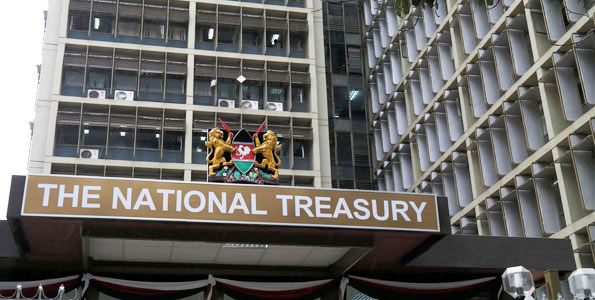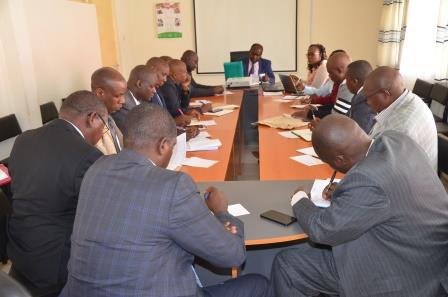The government is putting adequate measures to contain growth in non-priority expenditures so as to reduce the fiscal deficit that will support reduction in the growth of public debt to ensure sustainability.
The National Treasury and Economic Planning Cabinet Secretary (CS) Njuguna Ndung’u said in the government budgeting process, the Sector Working Groups have been tasked to carefully scrutinise all proposed programmes for Ministries, Departments and Agencies (MDAs) and ensure that they are not only directed towards improving productivity, but are also aligned to the achievement of the objectives.
Speaking Thursday during the launch of the Financial Year (FY) 2023/24 budget preparation process, Prof Ndung’u said that the government will strengthen institutions that will set outright targets and goals of the legal framework and appropriate incentives that will support the fight against corruption to eliminate pilferage of public resources.
“The Government will pursue fiscal consolidation policy in pursuit of attaining debt sustainability. The policy’s main objective is to free resources to growth-enhancing programmes by gradually reducing the overall fiscal deficit and the pace of debt accumulation,” said the CS.
Prof Ndung’u explained that fiscal consolidation will be supported by enhanced and innovative revenue mobilization, sustained rationalization of non-priority recurrent expenditures and redirecting resources to finance priority growth-supporting capital projects with high return on investment.
The CS highlighted that the Medium-Term Fiscal Framework will be anchored on real Gross Domestic Product (GDP) growth, above 6.0 per cent over the medium-term, with inflation being maintained within the range of plus or minus 2.5% of the target 5% after the current shocks are resolved.
“We are also focused on protecting competitiveness so that interest rate and exchange rate are stable and predictable over the medium-term,” said Prof Ndung’u.
He added that the government is also working at gradual improvement in revenue collection to over 18.0 per cent of the GDP over the medium-term, gradual reduction in expenditures to about 22.7% of GDP over the Medium-Term, in line with the fiscal consolidation policy.
On the economic outlook, Prof Ndung’u said that majority of countries across the world are currently facing serious economic challenges that have dashed hopes for economic recovery agenda after Covid-19 global pandemic, adding that the ongoing Russia-Ukraine conflict has resulted in disruption of global supply chains, which in turn has caused a sharp rise in the prices of energy, food, and other commodities, thereby triggering high inflation.
Worse still, back home, these effects have been further amplified by the drought effects.
“According to the report by the International Monetary Fund (IMF) in October 2022, the global growth forecast is likely to slow from 6.0 per cent in 2021 to 3.2 per cent in 2022 and 2.7 per cent in 2023. Global inflation is expected to rise from 4.7 per cent in 2021 to 8.8 per cent in 2022, but decline to 6.5 per cent in 2023,” he said.
The CS added that growth in Sub-Saharan African economies is expected to slow from 4.7 per cent in 2021 to 3.6 per cent in 2022, before rebounding at 3.7 per cent in 2023.
“Domestically, the robust pace of economic recovery projected in 2021 has been derailed by the worsening drought situation which has affected over 20 Counties. Although the Kenyan economy has demonstrated some kind of resilience and recovery from Covid-19 shocks, the growth decline from 7.5 per cent in 2021 to 5.3 per cent in 2022 and will recover to around 6.0 per cent in 2023 and the medium-term,” said Prof Ndung’u.
He explained that positive growth momentum was recorded in the first quarter of 2022, with the economy expanding by a remarkable 6.8 per cent compared with a growth of 2.7 per cent in a similar quarter in 2021. This growth was supported by positive economic activity in all sectors of the economy except the agricultural sector that contracted by 0.7 per cent in the first quarter of 2022 on account of the prolonged drought.
On the government’s bottom-up agenda, Prof Ndung’u said that the approach will involve supporting appropriate market, governance, regulation and protection that will support increased production and productivity downstream and increased income upstream.
“The government will develop interventions to correct market and institution failure problems through schemes that will ensure that benefits of growth are distributed and shared fairly across all clusters of the society by creating opportunities for all,” said the CS.
He said that they expect the Sector Working Groups to prioritize bottom-up economic interventions including support the working of markets in all segments through proper governance, regulation and protection; agricultural transformation and inclusive growth interventions to increase agricultural production and productivity that is dependent on the functioning of markets.
“We are also working to support the Micro Small and Medium Enterprises (MSMEs) economy by increasing access to credit in order to support MSMEs through interventions that correct market failure like the Hustler Fund,” said Prof Ndung’u.
By Joseph Ng’ang’a





